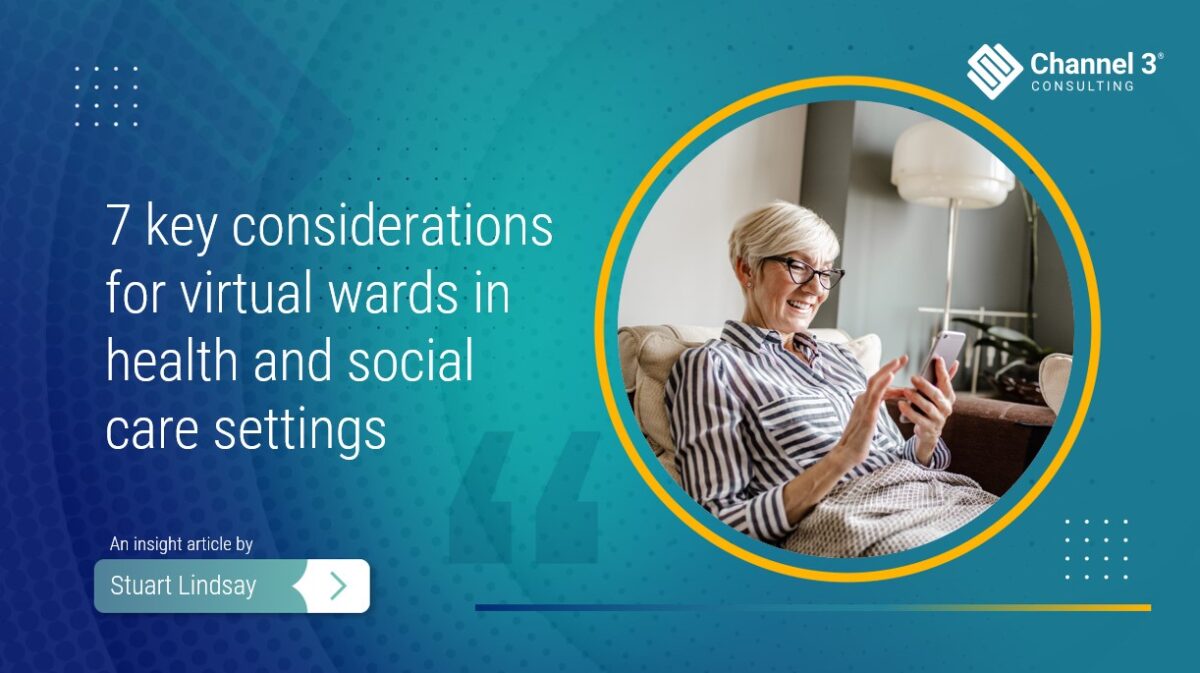
Both the NHS 2022/23 operational planning guidance (discussed here) and the NHSX guide to setting up technology-enabled virtual wards stress the importance of creating virtual wards as we enter 2022.
The case for change is clear: virtual wards can help us manage demand in a system that is lacking both physical space (beds) and workforce capacity.
The benefits of virtual wards are also clear. They can support system flow, admission avoidance and rapid discharge, therefore reducing immediate demand within the acute sector. In turn, the acute sector can make inroads on clearing elective backlogs.
Whilst the pandemic has accelerated the digital and technological agenda into the mainstream, a sustainable approach to embedding virtual wards and other initiatives across the health and care sectors is the vital next step. With this in mind, the design and implementation of virtual wards should consider the following:
1. Design from the perspective of the individual
Keeping the person at the heart of their care remains critical. A discussion with individuals and their families about how they want to live their lives will help focus their recovery efforts and ensure they are not seen as a condition or person to ‘fix’. Services coming together, sharing information, to support their care and recovery is important.
2. A familiar place of residence is more conducive to recovery – but needs the right resources and funding model
Social workers, social care providers and community health providers (including primary care) are best placed to support people and their families in an enabling way. However, resources are significantly stretched, so keeping people in their own homes benefits the system and the person. To do this safely, a clear operating model that includes the right resources and appropriate funding is important to avoid detrimental effects on the person.
3. Where recovery takes place at home, it must be closely managed
The benefits of at-home recovery can be overshadowed – or completely lost –if care is insufficiently monitored and managed. Proactive management of appropriate measures avoids clinical risk and improves outcomes. Without it, we risk readmissions and additional pressure on acutes. It’s paramount that virtual wards have the right governance model that safely returns people home whilst recognising the potential triggers of clinical risk.
4. It’s never just about the technology
Technical solutions are important, but success with virtual wards really depends on building confidence in the practical adoption of technical solutions with the person and their family. They must be provided with flexible ways of adopting technology properly, achieved through effective communication, engagement and ongoing proactive support. Planning for this should be specific to the individual, the local area and the resources that are available.
5. Sweat the details on the operating model
Assessing the risk across a range of scenarios and ensuring there are appropriate responses in each case will give confidence to clinicians, people and their families that the technology not only works but provides a benefit. The aim is to prevent unnecessary technology-related issue escalation by creating clear user journeys. A clear steer on how and when to act on changing behaviours and technology insights can avoid unnecessary callouts or alerts.
6. Social care must be included in the development of virtual wards
A person who is recovering from a period of ill health is likely to have a range of health and social needs. It’s essential to take a whole-system approach to developing a solution to those needs. From the person’s perspective, they are on a single journey of recovery. They should not feel that one journey ends and another begins when they are supported with virtual wards and move between acute and social care support.
7. Follow a prototyping approach to implementation
Success is most likely to come through starting small, testing, iterating and then scaling up. This method will help identify and manage risk. Crucially, it will also relieve the behavioural and cultural challenges of cross-sector working.
Virtual wards have been implemented in the past two years out of necessity, as a reactive solution to immediate health and care demands. Experience suggests that their long-term success will depend on making them a core part of a sustainable, mainstream model of care. The aim must be to genuinely improve outcomes and address operational pressures, rather than adopt new models of care for technology’s sake.
Health and social care organisations can access the external support and experience that is needed to successfully plan and implement a virtual ward provision. I for one am looking forward to seeing how virtual wards can provide better care for the public in the coming months and years.

Stuart has over 20 years of experience within frontline services and consultancy within health and social care. He specialises in delivering whole system transformational change through independence-focused demand management by embedding strength-based practice, enablers to independence such as technology-enabled care and system performance improvement. The ability to lead teams through the change process has been critical to his achievements.
You can contact Stuart using our online form or via LinkedIn.
